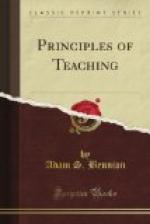“Oh, well, he’s got it in for me.”
It is always interesting to know whether a parent or teacher disciplines a child because the child needs it, or because the parent or teacher is unnerved and has to give expression to his feelings. The disciplinarian who can correct, when correction is necessary, both in firmness yet in fairness, so that the person who is corrected is made to feel that the correction grows out of a desire to help rather than merely to punish—that disciplinarian will exert an influence for good that is hard to estimate. He is both a friend and a benefactor.
Let us conclude this chapter with that wonderful passage from the Doctrine & Covenants which gives us the word of the Lord on this matter of controlling others:
“Behold, there are many called,
but few are chosen. And why are they
not chosen?
“Because their hearts are
set so much upon the things of this world,
and aspire to the honors of men,
that they do not learn this one
lesson—
“That the rights of the Priesthood
are inseparably connected with the
powers of heaven, and that the powers
of heaven cannot be controlled
nor handled only upon the principles
of righteousness.
“That they may be conferred upon us, it is true; but when we undertake to cover our sins, or to gratify our pride, our vain ambitions, or to exercise control, or dominion, or compulsion, upon the souls of the children of men, in any degree of unrighteousness, behold, the heavens withdraw themselves; the Spirit of the Lord is grieved; and when it is withdrawn, Amen to the Priesthood, or the authority of that man.
“Behold! ere he is aware,
he is left unto himself, to kick against
the pricks; to persecute the Saints,
and to fight against God.
“We have learned, by sad experience, that it is the nature and disposition of almost all men, as soon as they get a little authority, as they suppose, they will immediately begin to exercise unrighteous dominion.
“Hence many are called, but few are chosen.
“No power or influence can
or ought to be maintained by virtue of the
Priesthood, only by persuasion,
by long suffering, by gentleness, and
meekness, and by love unfeigned;
“By kindness, and pure knowledge,
which shall greatly enlarge the
soul without hypocrisy, and without
guile;
“Reproving betimes with sharpness,
when moved upon by the Holy Ghost,
and then showing forth afterwards
an increase of love toward him whom
thou hast reproved, lest he esteem
thee to be his enemy;
“That he may know that thy
faithfulness is stronger than the cords of
death;




